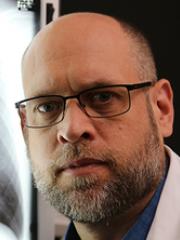Associate Professor Carl Stephan

Dr Carl Stephan heads the human craniofacial and skeletal identification lab.
Researcher biography
Assoc. Prof. Stephan is an anatomist and forensic anthropologist with research interests in skeletal analysis and identification in the medicolegal setting. Specifcally these research interests include: craniofacial identification, radiographic comparison, trauma, unmingling of skeletons, biological profile estimations and standards of practice. Carl heads the Laboratory for Human Craniofacial and Skeletal Identification (HuCS-ID Lab), and is Chief Anatomist at The University of Queensland (UQ) School of Anatomy.
Carl is a Fellow of The American Academy of Forensic Sciences and recent past President of the International Association of Craniofacial Identification. Carl served as Special Issue Managing Guest Editor for Forensic Science International, Latest Progress in Craniofacial Identification, 2018. He has been Editorial Board Member of the Journal of Forensic Sciences (2013-23) and Associate Editor of Forensic Anthropology (2016-20). Carl founded the SBMS Skeletal Collection and Skeletisation Program at UQ in late 2014, re-energising forensic osteology within the UQ School of Anatomy and more broadly within the School of Biomedical Sciences.
Carl's prior appointments include forensic anthropology analyst with the Iraq Mass Graves Investigation Team (USA Army Corps of Engineers on behalf of the USA Department of Justice) and ORISE researcher at the USA Department of Defence Central Identification Laboratory in Hawaii. He often now serves as an external consultant to the USA Defence POW/MIA Accounting Agency (DPAA). At UQ and as Chief Anatomist and School of Anatomy manager, Carl works very closely with the SBMS Gross Anatomy Facility, in all matters of anatomy teaching, research and governance management.
Working in joint with the GAF Manager, Carl has cross adapted ISO17025 style practices and auditing procedures to the UQ School of Anatomy space and introduced the first Code-of-Practice for Use of Human Tissues within the UQ School of Anatomy since its inauguration (1927). These accreditation-style policies and procedures are further implemented and expanded in the HuCS-ID Lab, providing vital learning experiences and skill sets for Honours and Higher Research Degree students wanting to pursue careers in forensic science. New data analytic, casework and research tools developed by the HuCS-ID Lab and in the statistical environment of R, are freely and routinely released for others to use at the website: CRANIOFACIALidentification.com.
Carl's research outputs currently exceed 100 total scientific publications, including more than 85 full-length research articles.
PhD and MPhil Supervision
- View current and completed supervisions on UQ Researchers.
Find out more information on how to apply for a Research Higher Degree (MPhil or PhD) with the School. For all enquiries regarding research supervision, please contact ask@uq.edu.au.
